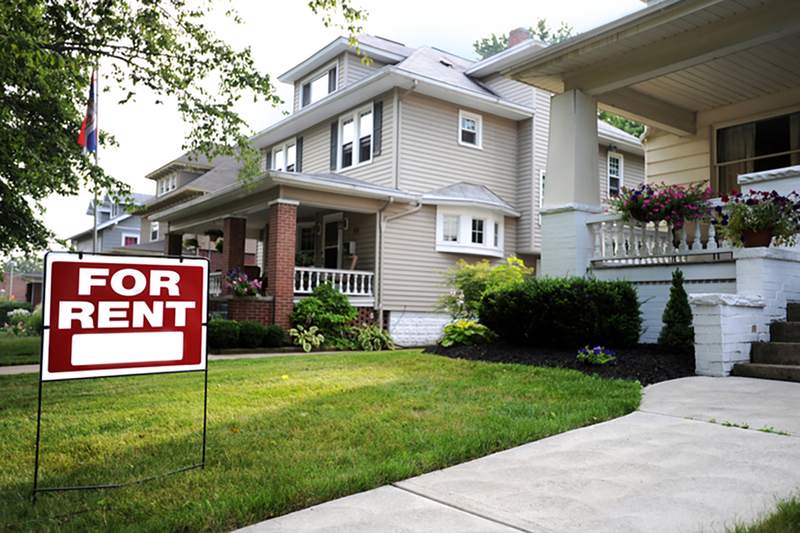Effective Nov. 16, 2025, both Fannie Mae and Freddie Mac no longer require a specific minimum credit score for conventional loan approval. Instead, loan decisions will be based on an analysis of overall credit risk factors.
Bolstering your finances with a steady stream of income can empower you to accomplish your goals, whether you want extra money to spend or save, retire early or send your kids to college. Rental properties can provide consistent monthly income, but securing the right financing can be tricky. When cash isn’t readily available for your investment, exploring various options for rental property financing becomes essential.
How To Finance A Rental Property: 6 Options
When venturing into the realm of real estate investment, understanding the diverse array of financing options is paramount. If you don’t have the cash to buy a rental property outright, you can finance the purchase in various ways. Each of these financing options has its advantages, disadvantages and eligibility requirements.
1. Conventional Loan
A conventional loan is a type of mortgage borrowers can get from a private lender, such as a bank or credit union. Because this loan type doesn’t have government backing, it is most accessible to borrowers with solid financial standing.
Advantages
- Competitive interest rates: Conventional loans often come with lower interest rates than other types of loans, especially if the borrower has a strong credit history.
- Flexible terms: Borrowers have a wide range of options in terms of loan terms (e.g., 15, 20, 30 years), allowing for customization based on individual financial goals.
- No private mortgage insurance (PMI) requirement with sufficient down payment: If borrowers can make a down payment of at least 20%, they typically won’t need to pay for private mortgage insurance, saving money in the long run.
- Conforming and non-conforming: Conventional loans come in conforming and non-conforming types, meaning you can go beyond the standard loan limits if you’re buying a large property.
Potential Drawbacks
- Strict credit requirements: Conventional loans for a rental property require a credit score of 620. Borrowers with less-than-stellar credit histories may face challenges in qualifying.
- Potentially higher down payment: Lenders usually require at least 15% down for borrowers buying a rental property, meaning a substantial lump sum is necessary to get the ball rolling.
- DTI standards: Lenders typically require a debt-to-income ratio (DTI) of 50% or less when you buy a rental property.
- Closing costs: Closing costs for conventional loans include inspection fees, appraisal fees, origination fees and application fees. These expenses can increase the upfront financial barrier by several thousand dollars.
2. FHA Loan
An FHA loan is a government-backed mortgage program that helps those with limited financial resources or lower credit scores buy a home. One key stipulation of an FHA loan is that the borrower must intend to occupy the property as their primary residence. This is also true for multi-family properties. As a result, a property investor can only utilize an FHA loan if they live in the property they purchase. After living in the property for a year, federal law allows the owner to begin renting it out.
Advantages
- Beneficial terms: FHA loans have advantages for first-time homebuyers and those with limited resources. For example, the down payment requirement is 3.5%, and interest rates can be lower than conventional loans.
- Increased borrower eligibility: FHA loans are less stringent than conventional loans when you apply. Specifically, you’ll need a credit score of 580, and your DTI can be as high as 57%.
Potential Drawbacks
- Intention to occupy and residency period: The borrower, who is also the property investor in this scenario, must demonstrate their intentions to make the purchased property their primary residence. To comply with FHA regulations, the borrower lives in the property for at least 1 year before considering renting it out.
- Mandatory mortgage insurance: FHA loans require both an upfront mortgage insurance premium (MIP) and an annual premium. Borrowers must bear this cost for the life of the loan unless they make a down payment of 10% or more, in which case MIP applies for the first 11 years of the loan.
- Property restrictions: FHA loans have specific requirements for the condition of the property, including no exposed studs, electrical problems, foundation issues or water damage. As a result, fixer-uppers often don’t qualify for an FHA loan.
3. Home Equity Loan
A home equity loan allows you to borrow against the equity in your home. This loan becomes a second mortgage, meaning you’ll pay monthly for this loan and your original mortgage. This option is only possible if you have sufficient equity in your primary residence. In addition, lenders typically limit these loans to 85% of your loan to value ratio (LTV). For instance, if you have $100,000 of equity, you can borrow $85,000 of it to finance a rental property purchase.
Advantages
- Preservation of existing mortgage terms: When you take out a home equity loan, it does not affect the terms or conditions of your existing mortgage. You’ll continue to make regular mortgage payments as before.
- Fixed interest: Home equity loans have fixed interest rates, providing consistency in your monthly payment.
- Similarity to conventional loans: Home equity loans have similar requirements and characteristics to a conventional mortgage. Home equity loans provide predictability to borrowers familiar with conventional loans.
Potential Drawbacks
- Risk of losing home: A home equity loan uses your home as collateral, so failing to repay it can result in foreclosure.
- Closing costs and fees: Like any other loan, home equity loans come with closing costs, which can include application fees, appraisal fees and other charges.
- Market fluctuations: If the real estate market experiences a downturn and your home’s value decreases, you may end up owing more than your home is worth due to the second mortgage.
- Limited funding ability: Home equity loans may not be large enough to finance the entire purchase of a rental property because your equity determines the loan size. For instance, $50,000 of equity can help finance a purchase, but that amount is insufficient on its own to get you a rental property.
4. Home Equity Line Of Credit (HELOC)
Similar to a home equity loan, a HELOC allows homeowners to borrow against their home’s equity. However, a HELOC operates more like a credit card, where borrowers can draw funds up to a certain limit and only pay interest on the amount used. In essence, a HELOC transforms equity into a line of credit you can tap for a specific period.
Advantages
- Flexibility in borrowing: A HELOC provides a flexible line of credit that you can draw from as needed, up to a predetermined limit. This feature allows you to borrow only what you require at any given time.
- Variable interest rates: While these types of rates can be cons as well, variable interest rates might be lower than fixed rates – at the beginning at least – potentially saving you money on some interest payments.
- Only pay interest on what you use: You are only charged interest on the amount you borrow, not on the total available credit limit. This can lead to lower overall interest costs if you don’t use the full credit line.
Potential Drawbacks
- Variable interest rates: While variable rates can initially be lower, they are subject to change based on market conditions. Your monthly payments could increase, decreasing this tool’s affordability.
- Risk of losing home: Similar to a home equity loan, if you fail to repay a HELOC, you risk losing your home through foreclosure.
- Closing costs and fees: Like home equity loans, HELOCs may come with closing costs, such as origination and appraisal fees, adding to the overall cost of borrowing.
- Market fluctuations: If the real estate market experiences a downturn and your home’s value decreases, it may affect the amount you can borrow through a HELOC.
- Limited availability: Just like with a home equity loan, you must have significant equity in your home to qualify for a HELOC. If you’ve recently purchased your home or its value has decreased, you may not be eligible. In addition, your equity may not be enough on its own to finance a rental property purchase.
5. Cash-Out Refinance
A cash-out refinance lets you simultaneously tap your equity and replace the mortgage on your primary residence with one that could better terms and rates, depending on market conditions.
Advantages
- Reduced monthly pPayment: Cash-out refinances can lower your mortgage’s interest rate (if the rate on your original mortgage is higher than current rates) and/or extend the term. Both of these features can lower the monthly cost of the mortgage for your primary residence or provide savings over time.
- Tap your equity: Similar to home equity loans and HELOCs, cash-out refinances give you access to the bulk of your equity, providing a lump sum for a rental property purchase.
Potential Drawbacks
- Higher loan amount: A cash-out refinance increases the total amount of your mortgage, which can result in higher monthly payments.
- Potential for higher interest rates: Depending on current market conditions, the interest rate on a cash-out refinance may be higher than the rate on your original mortgage, increasing mortgage costs.
- Closing costs: Like any mortgage transaction, a cash-out refinance comes with closing costs, which can include application fees, appraisal fees and other charges. These costs can add to the overall expense of the refinance.
- Loss of equity: As with home equity loans and HELOCs, you leave yourself vulnerable to financial stress when you use your equity. Doing so leaves you with less financial cushion in case of unexpected expenses or a decline in property values and can result in losing your home if you can’t afford your mortgage.
6. Hard Money Loan
A hard money loan is a type of short-term, asset-based loan from private individuals or companies instead of a bank or credit union. Hard money loans use your home as collateral, meaning your income and credit are less critical for qualifying.
Advantages
- Quick access to funds: Hard money loans can be processed much faster than traditional loans, often within days. This trait is crucial for real estate investors who need to move quickly on a deal.
- Flexible approval criteria: Hard money lenders primarily look at the value of the property you use as collateral. This way, borrowers with less-than-ideal credit histories may be able to secure a loan.
- Ability to finance unique pProperties: Hard money lenders are often more willing to finance unconventional or distressed properties that traditional lenders might be hesitant to approve.
- Customized terms: Hard money lenders have the flexibility to negotiate terms, allowing for more tailored agreements to meet the specific needs of the borrower and the property.
Potential Drawbacks
- Higher costs: Hard money loans involve higher closing costs and interest rates than conventional loans, making borrowing more expensive.
- Short loan terms: Hard money loans are short-term loans, often with terms ranging from 6 months to a few years. Therefore, the borrower needs to have a clear exit strategy, such as selling the property or refinancing.
- High monthly payments: With such short terms and higher interest rates, monthly payments will be significantly higher than with a mortgage.
- Risk of property loss: If you can’t repay or refinance the loan in time, the hard money lender has the right to take possession of the collateral property (in this case, the rental property).
- Limited regulatory oversight: Unlike traditional lenders, hard money lenders are not subject to the same regulatory standards. As a result, borrowers need to exercise caution and conduct thorough due diligence when selecting a lender.
- Not suitable for long-term financing: Hard money loans aren��’t suitable for long-term financing needs. Instead, they cover short-term investments where the borrower plans to repay the loan quickly, either by selling the property or refinancing the loan.
While these loans may be more flexible, they come with very high risks and are not recommended for the average investor. It’s best to speak with a financial advisor to learn more.
See What You Qualify For
Buy A Home
Discover mortgage options that fit your unique financial needs.

Refinance
Refinance your mortgage to have more money for what matters.
Tap Into Equity
Use your home’s equity and unlock cash to achieve your goals.
What’s The Best Option For Financing Rental Property?
Deciding on the most suitable financing option for a rental property involves a careful evaluation of your financial situation, goals and preferences. When deciding on how to purchase a rental property, it’s best first to assess your financial position, including your creditworthiness, income and existing debt. These factors will determine your eligibility for the different loan types.
Next, consider what size of a down payment you can afford. Remember, conventional mortgages and FHA loans require a down payment, but tapping your equity doesn’t. Therefore, if you’ve built up a lot of equity, you can use that resource instead of a traditional loan product and bypass the down payment requirement.
You’ll also need to contemplate the risks. While conventional loans, FHA loans, and hard money loans use the rental property as collateral, equity-based financing puts your primary residence at risk. As a result, you might choose a conventional loan because it only risks the investment property.
Remember, it’s crucial to research and compare interest rates, terms and conditions for each financing option. Shopping around will help you understand how these factors impact your monthly payments and overall cost. Then, you can pick the financing option that fits your budget.
Estimate the potential rental income and expenses associated with the property. Doing so will help determine how the financing option affects your cash flow. For example, if you project that your rental income will cover the cost of a conventional loan payment, the investment property won’t disrupt your monthly budget.
Additionally, tax implications are a crucial aspect. Tax advantages can make investing more affordable, so figure in the following deductions to your overall cost:
- Property taxes and insurance
- Mortgage interest
- Property management fees
- Maintenance and repair costs
- Qualified business expenses, including advertising, office space, business equipment, legal and accounting fees and travel
Find A Mortgage Today and Lock In Your Rate!
Get matched with a lender that will work for your financial situation.
Tips For Financing An Investment Property
The following tips will equip you to secure financing for your investment property and make informed decisions that align with your financial goals. Remember that each tip complements the others, so implementing them together has a synergistic effect on the success of your investment.
Maintain A Good Credit Score
Your credit score is a critical factor that lenders consider when evaluating your eligibility for a loan. A higher credit score indicates responsible financial behavior, making you a more attractive borrower. It demonstrates your ability to manage debt and make timely payments. In addition, your score must pass specific thresholds to acquire certain types of financing, such as a minimum score of 620 for a conventional loan.
Remember, a higher score often translates to lower interest rates, which can significantly affect the overall cost of your investment property loan. Plus, a solid credit score can help you qualify for more favorable loan terms and larger loan amounts. Therefore, taking the time and effort necessary to raise your score can help you obtain the loan you need to start investing in rentals.
Make A Large Down Payment
Your down payment is a strategic element when financing an investment property. A larger down payment reduces the amount you need to borrow, leading to lower monthly payments and better loan terms. It also demonstrates to lenders that you have a serious financial commitment to the property. In addition, it may be a requirement for some mortgage types (such as conventional) or help offset loan costs (as with FHA loans).
Enlist The Help Of A Financial Advisor
A financial advisor is a professional who can provide expert guidance on the various aspects of real estate investing, including financing. They can help you evaluate your financing options, clarify investment goals and create a customized investing plan. Their expertise can be instrumental in making informed decisions and maximizing the profitability of your investment property. Specifically, a certified financial planner (CFP) qualification indicates expertise in real estate, investing and planning. A financial advisor with this certification can provide thorough, balanced knowledge of property types and the loans you can use.
The Bottom Line
When it comes to financing a rental property, it’s crucial to consider the diverse array of options available. Each option comes with its own set of advantages, disadvantages and eligibility requirements. Understanding your financial situation, goals and risk tolerance is paramount in making an informed decision. Furthermore, a strong credit score, the ability to make a solid down payment and guidance from a financial advisor can help you invest wisely.
Ultimately, by carefully evaluating these financing options and incorporating the above tips, you can secure the financing that best aligns with your investment goals and sets you on a path toward successful real estate ventures.

Ashley Kilroy
Ashley Kilroy is an experienced financial writer who writes for solo entrepreneurs as well as for Fortune 500 companies. She is a finance graduate of the University of Cincinnati. When Ashley isn’t helping people understand their finances, you may find her cage-diving with great whites or on safari in South Africa.












